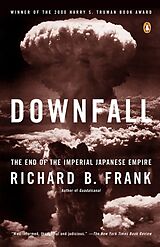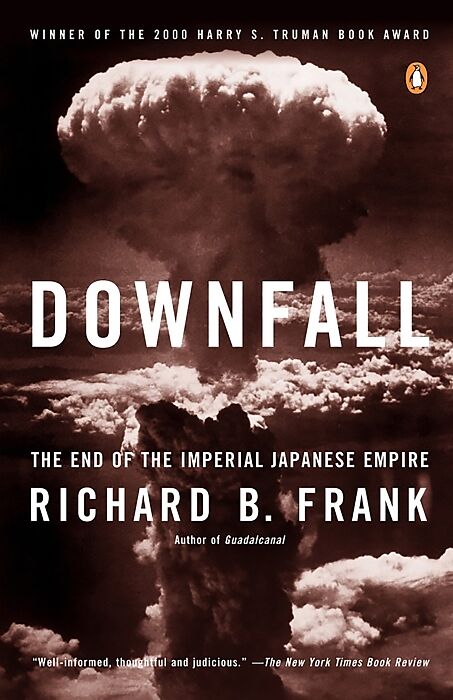Downfall
Einband:
Taschenbuch
EAN:
9780141001463
Untertitel:
The End of the Imperial Japanese Empire
Genre:
Geschichte
Autor:
Richard B Frank
Herausgeber:
PENGUIN GROUP
Anzahl Seiten:
512
Erscheinungsdatum:
01.05.2001
ISBN:
0141001461
Zusatztext Praise for Guadalcanal "Brilliant . . . an enormous work based on the most meticulous research. Here is everything you might want to know about Guadalcanal." -- Los Angeles Times Book Review "Richard Frank has produced what will surely become the standard history of the U.S. Navy's most important campaign. . . . A stunning debut by a major new talent in American letters." --Tom Clancy "Guadalcanal is a masterly account of what happened and why. . . . Books of this quality are rare! and Richard B. Frank should be commended for his authoritative inaugural work." -- Chicago Tribune "Mr. Frank's book is impressive in virtually all respects--a vividly and carefully crafted monument that is worthy of the Americans and Japanese who collided . . . on a little-known island named Guadalcanal." -- The New York Times Book Review Informationen zum Autor Richard B. Frank was born in Kansas in 1947. He served for almost four years in the United States Army, including a tour of duty in Vietnam as an aerorifle platoon leader with the 101st Airborne Division. He is the author of Guadalcanal . Klappentext In a riveting narrative that includes information from newly declassified documents, acclaimed historian Richard B. Frank gives a scrupulously detailed explanation of the critical months leading up to the dropping of the atomic bomb. Frank explains how American leaders learned in the summer of 1945 that their alternate strategy to end the war by invasion had been shattered by the massive Japanese buildup on Kyushu, and that intercepted diplomatic documents also revealed the dismal prospects of negotiation. Here also, for the first time, is a comprehensive account of how Japan's leaders were willing to risk complete annihilation to preserve the nation's existing order. Frank's comprehensive account demolishes long-standing myths with the stark realities of this great historical controversy.Tokyo Burns: Raid of March 9-10 "A silver curtain falling" With the night came north winds, blowing bitter and cold across the uneasy city. By 8:00 p.m., great shuddering gusts, at 45 to 67 miles per hour, "violent as a spring typhoon," shoved against the wooden walls and pried at the doors and windows of the dwellings of Tokyo's 4.3 million citizens. Elsewhere, the winds toppled or jammed radar antennas and made mischief with communications. On the pitching seas to the south, picket-boats raised frantic alerts of many approaching bombers, but faulty radio reception--and faulty organization--muffled the alarms. On radios throughout the capital, the voice of Hidetoshi Matsumura, the spokesman for Imperial General Headquarters, hailed the coming day, March 10, as Army Day. His oration ended in the weary cliché: "The darkest hour is just before dawn." His words had barely faded when, at 10:30 p.m., sirens sounded the long, steady wail warning of distant but potentially threatening aircraft. In contrast to the pervasive disorder that had invaded and overwhelmed all aspects of daily life in the capital, the air-raid alert system that roused many from mid-slumber was still respected for its efficiency. With electric lights forbidden after nightfall and cooking gas nonexistent, most families now habitually prepared and ate meals at twilight and then retired early. But even in repose, Tokyo's denizens remained partly dressed, usually in shapeless, loose monpe trousers. Near midnight, coast watchers reported droning noises that were likely from B-29s. The listeners could speak with authority, for the dreaded Superfortresses--known to the Tokyoites as "bikko," "B-san," "Lord B.," "okyakusama" (visitors), and "regular mail"--had come many times to the capital, though only once at night, and never in such numbers or so low. Surpr...
Praise for Guadalcanal
"Brilliant . . . an enormous work based on the most meticulous research. Here is everything you might want to know about Guadalcanal."
--Los Angeles Times Book Review
"Richard Frank has produced what will surely become the standard history of the U.S. Navy's most important campaign. . . . A stunning debut by a major new talent in American letters."
--Tom Clancy
"Guadalcanal is a masterly account of what happened and why. . . . Books of this quality are rare, and Richard B. Frank should be commended for his authoritative inaugural work."
--Chicago Tribune
"Mr. Frank's book is impressive in virtually all respects--a vividly and carefully crafted monument that is worthy of the Americans and Japanese who collided . . . on a little-known island named Guadalcanal."
--The New York Times Book Review
Autorentext
Richard B. Frank was born in Kansas in 1947. He served for almost four years in the United States Army, including a tour of duty in Vietnam as an aerorifle platoon leader with the 101st Airborne Division. He is the author of Guadalcanal.
Klappentext
In a riveting narrative that includes information from newly declassified documents, acclaimed historian Richard B. Frank gives a scrupulously detailed explanation of the critical months leading up to the dropping of the atomic bomb. Frank explains how American leaders learned in the summer of 1945 that their alternate strategy to end the war by invasion had been shattered by the massive Japanese buildup on Kyushu, and that intercepted diplomatic documents also revealed the dismal prospects of negotiation. Here also, for the first time, is a comprehensive account of how Japan's leaders were willing to risk complete annihilation to preserve the nation's existing order. Frank's comprehensive account demolishes long-standing myths with the stark realities of this great historical controversy.
Leseprobe
Tokyo Burns: Raid of March 9-10
"A silver curtain falling"
With the night came north winds, blowing bitter and cold across the uneasy city. By 8:00 p.m., great shuddering gusts, at 45 to 67 miles per hour, "violent as a spring typhoon," shoved against the wooden walls and pried at the doors and windows of the dwellings of Tokyo's 4.3 million citizens. Elsewhere, the winds toppled or jammed radar antennas and made mischief with communications. On the pitching seas to the south, picket-boats raised frantic alerts of many approaching bombers, but faulty radio reception--and faulty organization--muffled the alarms.
On radios throughout the capital, the voice of Hidetoshi Matsumura, the spokesman for Imperial General Headquarters, hailed the coming day, March 10, as Army Day. His oration ended in the weary cliché: "The darkest hour is just before dawn." His words had barely faded when, at 10:30 p.m., sirens sounded the long, steady wail warning of distant but potentially threatening aircraft. In contrast to the pervasive disorder that had invaded and overwhelmed all aspects of daily life in the capital, the air-raid alert system that roused many from mid-slumber was still respected for its efficiency. With electric lights forbidden after nightfall and cooking gas nonexistent, most families now habitually prepared and ate meals at twilight and then retired early. But even in repose, Tokyo's denizens remained partly dressed, usually in shapeless, loose monpe trousers.
Near midnight, coast watchers reported droning noises that were likely from B-29s. T…

Leider konnten wir für diesen Artikel keine Preise ermitteln ...
billigbuch.ch sucht jetzt für Sie die besten Angebote ...
Die aktuellen Verkaufspreise von 6 Onlineshops werden in Realtime abgefragt.
Sie können das gewünschte Produkt anschliessend direkt beim Anbieter Ihrer Wahl bestellen.
Loading...
Die aktuellen Verkaufspreise von 6 Onlineshops werden in Realtime abgefragt.
Sie können das gewünschte Produkt anschliessend direkt beim Anbieter Ihrer Wahl bestellen.
| # | Onlineshop | Preis CHF | Versand CHF | Total CHF | ||
|---|---|---|---|---|---|---|
| 1 | Seller | 0.00 | 0.00 | 0.00 |
